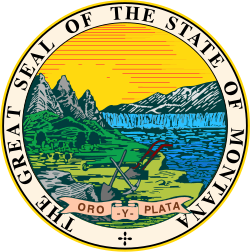| |||||||||||||||||
| |||||||||||||||||
 County results Melcher: 40–50% 50–60% 60–70% 70–80% Williams: 40–50% 50–60% | |||||||||||||||||
| |||||||||||||||||
| Elections in Montana |
|---|
 |
The 1982 United States Senate election in Montana took place on November 2, 1982. Incumbent United States Senator John Melcher, who was first elected to the Senate in 1976, opted to run for re-election. He won the Democratic primary after he faced a tough intraparty challenger, and advanced to the general election, where he faced Larry R. Williams, an author and the Republican nominee, and Larry Dodge, the Libertarian nominee. Though his margin was reduced significantly from his initial election, Melcher still comfortably won re-election to his second and final term in the Senate.

